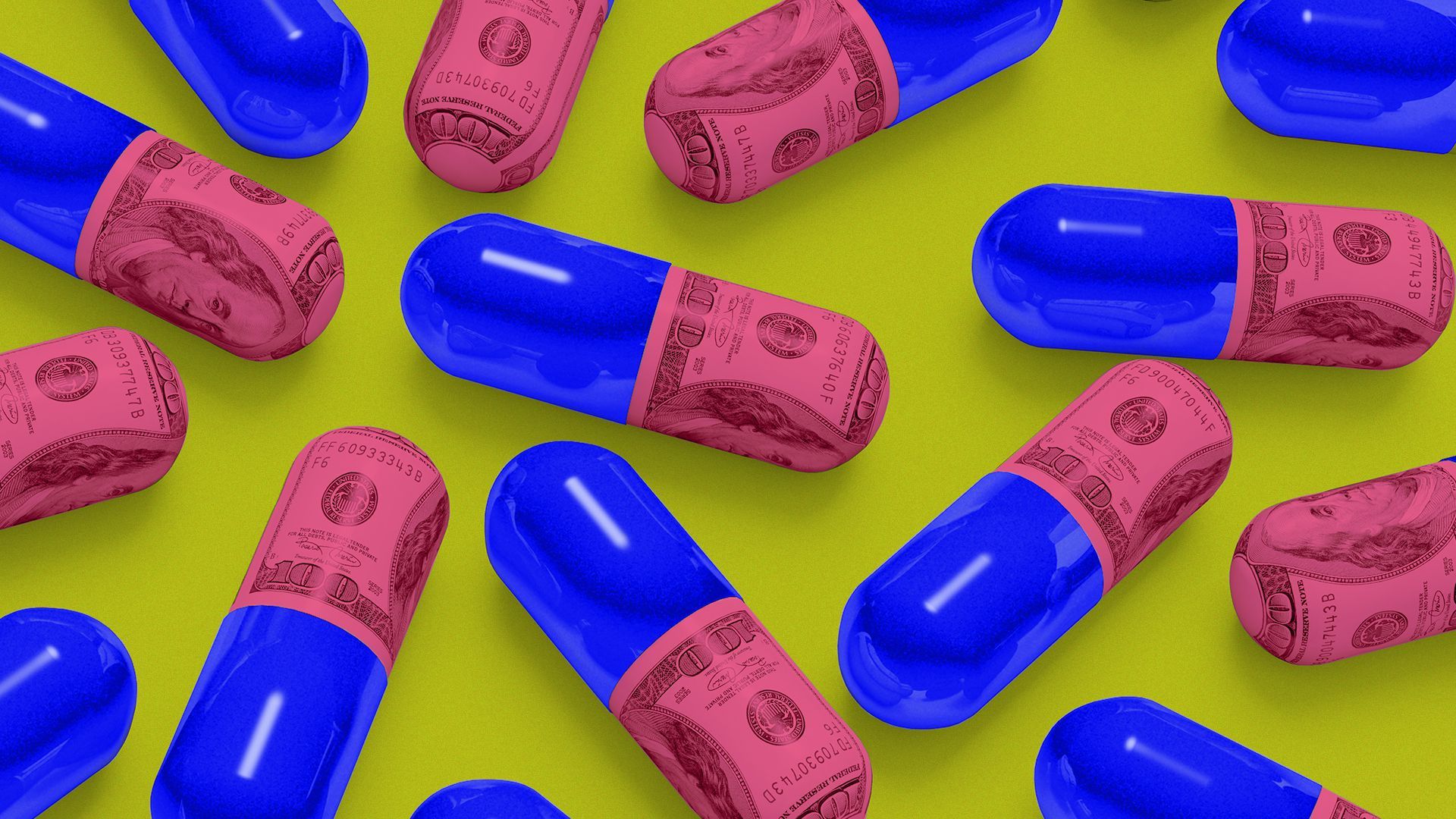| | | | | | | Presented By PhRMA | | | | Vitals | | By Caitlin Owens ·May 07, 2021 | | Good morning. This Sunday, "Axios on HBO" returns: Sen. Bernie Sanders talks with national political correspondent Jonathan Swan about police reform, student loan debt, negotiating with Republicans, and more ... (See Clip.) - Tune in at 6pm ET/PT on HBO and HBO Max.
Today's word count is 1,171, or a 4-minute read. | | | | | | 1 big thing: Democrats are still looking for a plan on drug prices |  | | | Illustration: Rae Cook/Axios | | | | Democrats have no workable plan to tackle the cost of prescription drugs, even with full control of Washington and after campaigning on the issue for years. The picture: Voters still care about the cost of drugs, but Democrats don't have a feasible legislative strategy yet — or an agreed-upon policy to fit into a legislative strategy. State of play: In his recent address to Congress, President Biden called for giving Medicare more leverage over the prices it pays for drugs. But nothing on drug prices was part of his proposed American Families Plan, which includes a slew of other Democratic priorities. Congressional Democrats say they still intend to tackle the issue. - Senate Majority Leader Chuck Schumer last week told The.Ink that he also supports allowing Medicare to negotiate prices.
- House Democrats held two hearings on a bill that would allow Medicare to negotiate the price of some drugs and tie its prices to what other countries pay.
Yes, but: Given Democrats' razor-thin majorities and the industry's colossal lobbying power, they likely couldn't corral the votes to pass such sweeping reforms in the Senate. - And they don't yet have a fallback plan that the whole caucus could support, especially in the face of fierce opposition from industry.
The bottom line: "If you're just looking at public opinion polling, this is something Democrats should be raising their hands on, 100%," Harvard professor Robert Blendon said. - "What helps you in the midterm is to have three or four issues which are very popular that you did something about," he added. "It's a very salient issue that would help most Democrats running in the midterm."
|     | | | | | | 2. The race to avoid a "monster" COVID variant |  | | | Illustration: Rae Cook/Axios | | | | Slow global COVID-19 vaccination rates are raising concerns that worse variants of the coronavirus could be percolating, ready to rip into the world before herd immunity can diminish their impact, Axios' Eileen Drage O'Reilly reports. Why it matters: The U.S. aims to at least partially vaccinate 70% of adults by July 4, which is expected to accelerate the current drop of new infections here. What we're hearing: "The virus was kind of stable for 10 months, and then it started getting into this accelerated evolution," said Eric Topol, founder and director of the Scripps Research Translational Institute. "Now, the real question is, is there any way for it to get any worse?" How it works: Viruses mutate and selective pressure can select those that transmit better in the population and that can better escape human's innate immunity, says Sarah Cobey, associate professor of ecology and evolution at the University of Chicago. - "We're seeing both right now," she says.
- It's unclear if SARS-CoV-2 will evolve in the long term as the type of virus that branches out into multitudes of variants that coexist or if it will have more of a replacement pattern, Cobey adds.
Go deeper. |     | | | | | | 3. Mixed response in Europe to patent waiver | | The Biden administration surprised the world this week by coming out in favor of waiving patents for coronavirus vaccines — but Europe is divided on the issue, Axios' Dave Lawler reports. What they're saying: European Commission President Ursula Von Der Leyen said Brussels would be willing to discuss it; French President Emmanuel Macron said he backed the U.S. position, but a German government spokesman said the proposal would cause "severe complications" for vaccine production. - Some European officials also took swipes at the U.S. for coming to the vaccine equity table late, after declining to export any vaccines at all until recently.
- At least 80 countries, led by India and South Africa, have called for vaccine IP to be waived, while rich countries and pharmaceutical companies had generally opposed the move.
The state of play: This issue is heading to the WTO, and will likely take months to resolve. It would then take at least several months more for facilities in the developing world to start pumping out vaccines. - Even then, most of the bottlenecks that are currently slowing global production — shortages of ingredients or vials, for example — will still exist, and the logistics of bringing new facilities on line will be complicated.
- Still, waiving the patents could allow producers in countries like Bangladesh and South Africa to start producing doses, potentially increasing the supply to developing countries in the medium term.
|     | | | | | | A message from PhRMA | | Americans don't need another barrier to their medicines | | |  | | | | We have to lower what patients pay for their medicines. We also have to make sure they are getting the medicines they need. The challenge: H.R.3 forces a choice between one or the other. There's a way to do both, but H.R.3 isn't it. Get the facts. | | | | | | 4. The true COVID death toll |  Data: IHME; Chart: Will Chase/Axios There have been twice as many deaths from COVID-19 around the world as have been reported, according to the University of Washington's Institute for Health Metrics and Evaluation (IHME), which analyzed excess mortality and other factors. The big picture: The U.S. has undercounted by over 300,000 deaths, while the death tolls in India and Mexico — second and third on the list, respectively — are nearly three times the official numbers, according to the analysis, Dave writes. "Many deaths from COVID-19 go unreported because countries only report deaths that occur in hospitals or in patients with a confirmed infection. In many places, weak health reporting systems and low access to health care magnify this challenge," the report notes. - In Russia, which has used unusually strict criteria for attributing deaths to COVID-19, the IHME estimate is five times the official number.
- In Egypt, there have been nearly 13 deaths for every one that's recorded, per the report.
|     | | | | | | 5. Enrollment surge may help Democrats | | Democrats' big investments in the Affordable Care Act appear to be paying off, Axios' Marisa Fernandez writes. Driving the news: Almost 1 million Americans have signed up for ACA coverage since February, roughly half of them in April alone, the Centers for Medicare & Medicaid Services said yesterday. - Why it matters: The strong enrollment numbers could help Democrats make the case that some of their changes to the ACA should become permanent.
What's happening: In its early days, the Biden administration created a special enrollment period that allows people to sign up for ACA coverage until the end of April. - And a temporary expansion of the ACA's premium subsidies, passed as part of coronavirus relief legislation, kicked in April 1.
By the numbers: The bigger subsidies have saved Americans a lot of money, according to CMS. - People who enrolled after April 1 are paying, on average, 25% less in premiums than people who signed up in February or March. Deductibles were about 90% lower for people who signed up after the bigger subsidies took effect.
- About 2 million people have seen their premiums fall after going back through the system to recalculate their costs after April 1, CMS said. The average savings for that group was 40%.
What's next: The premium bump lasts for two years, but the Biden administration is looking to make it permanent. |     | | | | | | 6. Majority back vaccine proof rules |  Data: Verywell; Chart: Will Chase/Axios Most Americans support requiring proof they've been vaccinated against COVID-19 before traveling, going to school or going to work, a recent survey by Verywell found. Why it matters: The idea of vaccine "passports" emerged early as a potential tool to reopen economies. But they've turned into a political flashpoint in several Republican-led states — and raised plenty of logistical challenges, Axios' Tina Reed reports. Details: Verywell Health polled 2,000 adults in the U.S. in early April about what activities people felt should require proof they'd gotten their COVID shots. - More than half thought vaccine proof should also be required for heading to concerts or sporting events, an approach New York rolled out this spring.
- Far fewer supported requiring proof for activities like sitting inside a restaurant or shopping indoors, or attending a religious service.
|     | | | | | | 7. Dog of the week | | Susie. Photo: Alex de Winter Unfortunately, we skipped last week. But we're back on track now. Meet Susie, a 3.5 year old beagle-boxer mix. - "She enjoys peanut butter, belly rubs, and long walks on the beach," according to her owner, Alex.
|     | | | | | | A message from PhRMA | | Congress: Here's why H.R.3 isn't the solution to lower cost drugs | | | | Americans don't need another barrier to their medicines. We have to lower what patients pay for their medicines. We also have to make sure they are getting the medicines they need. H.R.3 forces a choice between one or the other. There's a way to do both, but H.R.3 isn't it. Get the facts. | | | | | | Axios thanks our partners for supporting our newsletters.
Sponsorship has no influence on editorial content. Axios, 3100 Clarendon Blvd, Suite 1300, Arlington VA 22201 | | | You received this email because you signed up for newsletters from Axios.
Change your preferences or unsubscribe here. | | | Was this email forwarded to you?
Sign up now to get Axios in your inbox. | | | | Follow Axios on social media:    | | | | | |









No comments:
Post a Comment